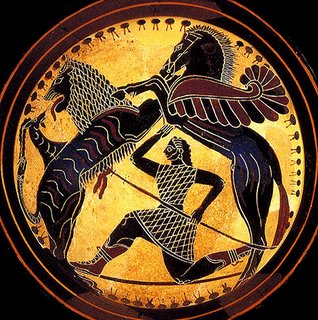Marsilio Ficino: A Study in Melancholy

Image from: http://www.beazley.ox.ac.uk/CGPrograms/Dict/image/bellerophon2.jpg
Nowadays, when we says someone is melancholy, we mean they are depressed and not enjoying life. In traditional astrology, however, calling someone melancholic had a far more complex and nuanced implication. First, it was directly related to temperament; a unique combination of personality and body type that we all possess. The four classical temperaments are phlegmatic (watery), choleric (fiery), sanguine (airy), and melancholic (earthy). Most people are a mix of two or more of these; if you possess all four in equal measure, you are that rare creature; a well-balanced individual. Melancholics are studious, contemplative, serious, practical, cautious and deliberate in all their words and deeds. They are not given to emotional scenes or histrionics.
In traditional medicine, melancholy is synonymous with the bodily humor of black bile, which is cold and dry, possessing the two qualities most antithetical to life. Aristotle described Bellerophontes as a melancholic, who, having fallen from Pegasus, wandered alone in desert places. Aristotle cites Homer’s description of Bellerophontes: “But when he was hated of all the gods, then he wandered alone on the plain of Aleïum, eating out his heart, and avoiding the track of men.” Here is a description of the coldest melancholy that can exist. Aristotle later makes the distinction between melancholy that is less cold, and thus less harmful, and the very extreme coldness seen in Bellerophontes.
Marsilio Ficino was a Renaissance scholar, priest, musician, poet, philosopher, physician, and astrologer. He was a prolific writer, both of books and of letters, and only recently have we been able to get our hands on decent English translations of his works. Two titles that spring to mind are Three Books on Life, and Meditations on the Soul, a book of some of his letters to well-known personages of his day, such as the Medicis, whom he served as a spiritual advisor.
Ficino struggled all his life with an excess of melancholy, and his Three Books on Life goes into extensive detail on how to cure melancholy, or at least keep it in balance. Many of his suggestions are especially useful because they address the proper lifestyle of scholars who are predisposed to melancholy by their occupation and by their horoscopes, which will tend to have strong melancholic planets, Mercury and/or Saturn. This is very applicable to us today, as many of us work in our sedentary jobs doing mostly cerebral (as opposed to physical) work. This kind of existence aggravates the black bile humor. Ficino’s recommendations stem from the understanding that melancholy is primarily a Saturnian illness. Saturn is best neutralized by Jupiter, and to a lesser degree, Venus and the Sun, so Ficino recommends remedies that are Jupiter-ruled, and therefore hot and moist, to neutralize the melancholic’s inherent cold and dryness.
One great recipe for melancholics, derived from Ficino’s recommendations, is warm almond milk with cinnamon; milk and almonds are naturally moist, while the warm liquid and cinnamon are both heating. This is a very good evening drink, as it is somewhat sedative and soothing. However, the bigger problem for melancholics tends to be the morning, as getting going early is rather against the inherent slowness of black bile. Lots of melancholics guzzle coffee like it’s going out of style to compensate for this, but we have noticed that a strong decoction of ginger-licorice-anise-cinnamon acts like morning rocket fuel for these people. Also, Ficino was a great believer in the power of clear white wine to balance melancholy.
As for non-dietary guidance, Ficino recommended that those predisposed to melancholy rise with the Sun (remember, this was before the days of artificial lighting), meditate and do one’s studies. One was to study no later than
Note that Bellerophontes’ loss of Pegasus provides a succinct description of what happens to melancholics when they don’t use their natural gifts for contemplation and spirituality. The black bile becomes even colder and they shun human contact, eating out their hearts. Perhaps this is one reason why today, it seems that everyone is on anti-depressants: our fast-moving lifestyles are not conducive to contemplation or faith, and those with melancholic tendencies have little outlet for their natural tendencies.


5 Comments:
Hi Nina,
I enjoyed your comments on the melancholic temperament and I am wondering if you can tell me how much of each ingredient to use for the cinnamon-anise decoction. I do guzzle coffee or tea in the morning like its going out of style, and I would like to try something else. I have the Charles Boer translation of "The Book of Life" which has all three books, but I couldn't find the recipe, so I would be most thankful if you could. My e-mail is pmccannbrown@hotmail.com, or you can always post it here, of course.
Thanks, Nina, and keep up the good work on the blog! I may also see you at one of these traditional astrology conferences soon, too.
Warmly, Peter
Hi Nina,
I sent a question earlier with regards to your melancholy post but I don't think it went through because there it is still listed a zero under comments. Anyhow, I'll try again, and I had another question too. But let me tell you that I enjoyed your post very much, as usual.
I was wondering if you could tell me the details of the recipe for the cinnamon-anise decoction, for I drink way too much coffee, and I was born with a bit too much melancholy. I looked for it in the Boer translation "The Book of Life" but I could not find it. I was also wondering about the almond milk. Do you have to mix ground almonds and dairy milk together or do you mean pure almond milk, that is, the kind you make with just almonds?
Anyhow, your help would be much appreciated, and keep up the good work on the blog, I enjoy it very much.
Warmly, Peter
Hi Peter,
I'm really glad you liked the post; thank you. I purposely left off proportions for the decoction, as it depends on your particular situation. I like to use the "hot" ingredients in a descending amount, but feel free to tweak, obviously. Licorice is moistening, so depending on how dry the melancholy is, you can put in more than just 1/4 of the total volume, or less.
I make a version of this tea (with more stuff), and licorice is the smallest ingredient by volume, so that might give you a starting point. If you're interested in the exact recipe (and don't want to experiment on yourself), let me know and I'll email it to you privately.
This exact recipe is not in Ficino's "Three Books," but he does list good herbs to use for melancholy in the first and second books, so I made the recipe myself based on his suggestions. I also know a little bit about Ayurvedic herbalism, so I used some of those principles as well when putting together the recipe. The point is that the tea is heating and moistening to dispel melancholic coldness and dryness.
Kind regards,
Nina
PS: The reason your comment did not go through is because comments first go to my email and I must approve them.
One more thing, Peter -
The almond milk Ficino recommends would have to be almonds and milk together. Not vegan "almond milk" made just with almonds, since almonds by themselves are not moistening enough.
Nina
Hi Nina,
Thanks for getting back to me so soon. That would be great if you could e-mail me the exact recipe, so that I don't have to experiment on myself. My e-mail is pmccannbrown@hotmail.com.. I look forward to hearing from you, and thanks for doing this.
Warmly, Peter
Post a Comment
<< Home